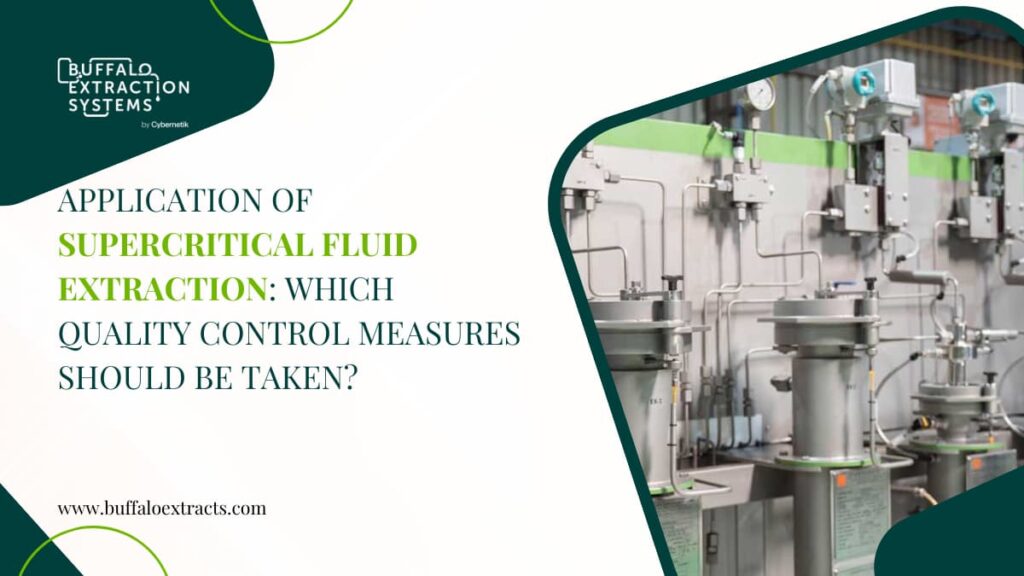Enhancing Product Quality with Supercritical Fluid Extraction: Key Quality Control Measures for Business Success
Application of supercritical fluid extraction (SCFE) is essential for obtaining pure and high quality extracts. This is a necessity in today’s competitive business environment, where maintaining product quality stands as a cornerstone of success across industries. Supercritical fluid extraction process (SCFE) has emerged as a cutting-edge technique offering businesses a means to efficiently extract valuable compounds while preserving product integrity. However, to fully capitalize on the benefits of SCFE and ensure the delivery of top-tier products, businesses need to implement rigorous quality control measures throughout the extraction process.
The crucial, even critical, role of quality control measures in ensuring product excellence and regulatory compliance can never be overstated. This is especially true for the Supercritical Fluid Extraction (SCFE) process. Quality control serves as the bedrock of every successful SCFE operation, encompassing meticulous attention to detail at every stage. This is the case right from the initial raw material selection to the final product validation. By implementing robust quality control protocols, businesses can safeguard product integrity, mitigate risks, and uphold the trust of consumers and regulatory authorities alike.
Following are some of the quality control measures that should be taken by a business for the successful application of Supercritical Fluid Extraction (SCFE):
- Raw Material Quality Assurance: The foundation of product quality begins with the selection and sourcing of raw materials. The better the source, the better the quality of the final product. Businesses must establish robust supplier qualification processes to ensure the procurement of high quality raw materials devoid of contaminants or impurities. By conducting meticulous quality checks upon receiving raw materials, companies can mitigate the risk of product defects and maintain consistency in the final output.
- Optimizing Supercritical Fluid Parameters: The efficacy of SCFE hinges on the precise control of critical parameters such as pressure, temperature, and flow rate. By fine-tuning these parameters, businesses can optimize extraction efficiency and maximize yield. Real-time monitoring coupled with advanced control systems is paramount to maintaining optimal conditions throughout the extraction process, thereby guaranteeing reproducibility and consistency in product quality. Close control over these parameters also enables targeted supercritical fluid extraction of products from the raw material, directly impacting the purity of the final product.
- Analytical Testing Protocols: Analytical testing serves as the linchpin of quality control in SCFE operations. Businesses can use sophisticated analytical techniques such as chromatography and spectroscopy to accurately quantify target compounds and evaluate product purity. Regular testing of both raw materials and extracted products enables early detection and, therefore, proactive correction of deviations, thereby ensuring adherence to stringent specifications and standards.
- Residual Solvent Analysis: The presence of residual solvents poses a significant concern in supercritical CO2 extraction process or SCFE, particularly in industries governed by stringent regulatory frameworks such as pharmaceutical and food products. Gas chromatography techniques are commonly employed to detect and quantify residual solvents, thereby ensuring compliance with regulatory requirements and upholding product safety standards.
- Ensuring Purity and Identity: Preserving the purity and identity of extracted compounds is paramount for meeting customer expectations and regulatory compliance. Through meticulous quality control measures, including identity testing and impurity profiling, businesses can verify the authenticity and integrity of their products. Such measures instill confidence among consumers and stakeholders, bolstering trust and credibility in the marketplace.
- Microbiological Assessment: Microbiological contamination poses a significant risk to product safety and shelf-life, particularly in industries involved in the production of consumables or topical formulations. Implementing stringent microbiological testing protocols enables businesses to monitor microbial levels effectively and mitigate the risk of contamination. By safeguarding product quality and consumer health, companies can uphold their reputation and brand integrity.
Apart from integrated sanitization techniques such as CIP system which cleanse the SCFE plant, automation is great way to minimize microbial load. This is because the lesser the number of people coming in contact with the system, the lower are the chances of contamination of the plant or any part there of. - Stability Testing for Long-Term Viability: Product stability represents a critical aspect of quality control, especially for goods requiring extended shelf-life. Through comprehensive stability testing conducted under diverse environmental conditions, businesses can assess shelf-life and ensure product efficacy over time. This proactive approach not only minimizes the risk of product deterioration but also enhances customer satisfaction and strengthens brand reputation.
- Validation and Documentation: Validation of the supercritical CO2 extraction process and meticulous documentation are indispensable components of quality control in SCFE operations. By meticulously documenting all facets of the extraction process, including process parameters, analytical results, and encountered deviations, businesses can demonstrate not just compliance with regulatory standards, but their excellence. This ensures transparency and traceability throughout the supply chain, fostering consumer trust and bolstering regulatory adherence.
Finally,
Quality control measures are unavoidable in the application of Supercritical Fluid Extraction (SCFE) if the process is to consistently deliver top-tier products for businesses. To boost product quality and gain a competitive edge, companies should prioritize the quality of raw materials and optimize extraction parameters. They should also conduct analytical testing and adhere to regulatory requirements. Embracing a proactive approach to quality control not only cultivates consumer trust and loyalty but also drives long-term business success and sustainability. Effective quality control measures are the cornerstone of successful SCFE implementation across industries. By adopting a proactive approach, businesses can ensure product purity, potency, and consistency, safeguarding consumer health, brand reputation, and regulatory compliance. Investing in robust quality control systems ultimately fosters trust and empowers businesses to capitalize on the full potential of supercritical fluid extraction.

